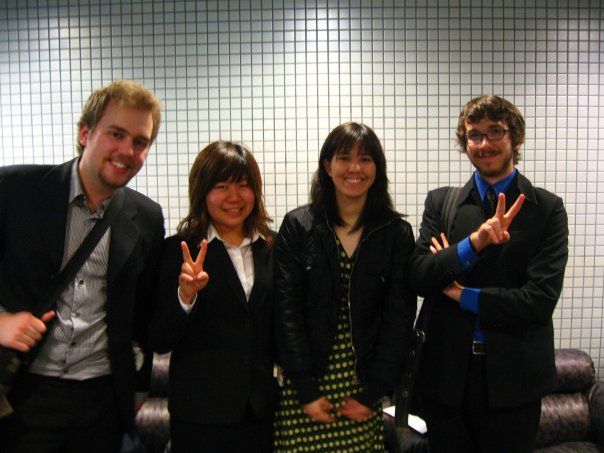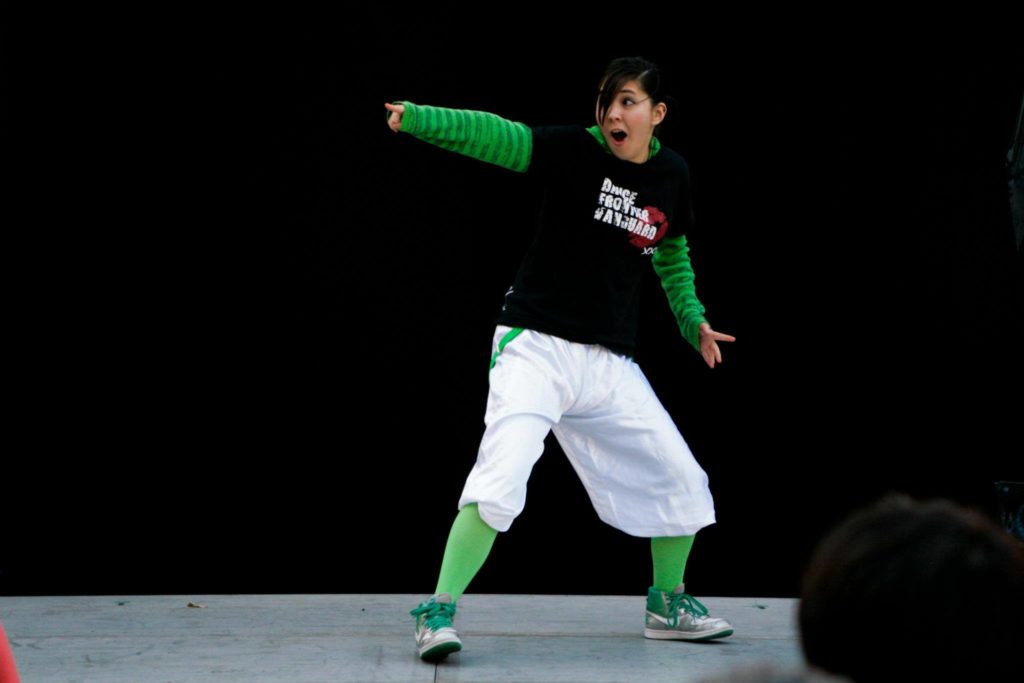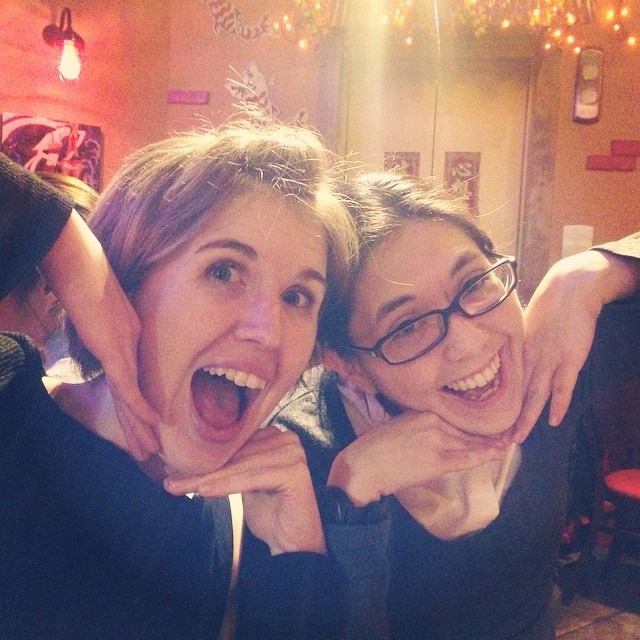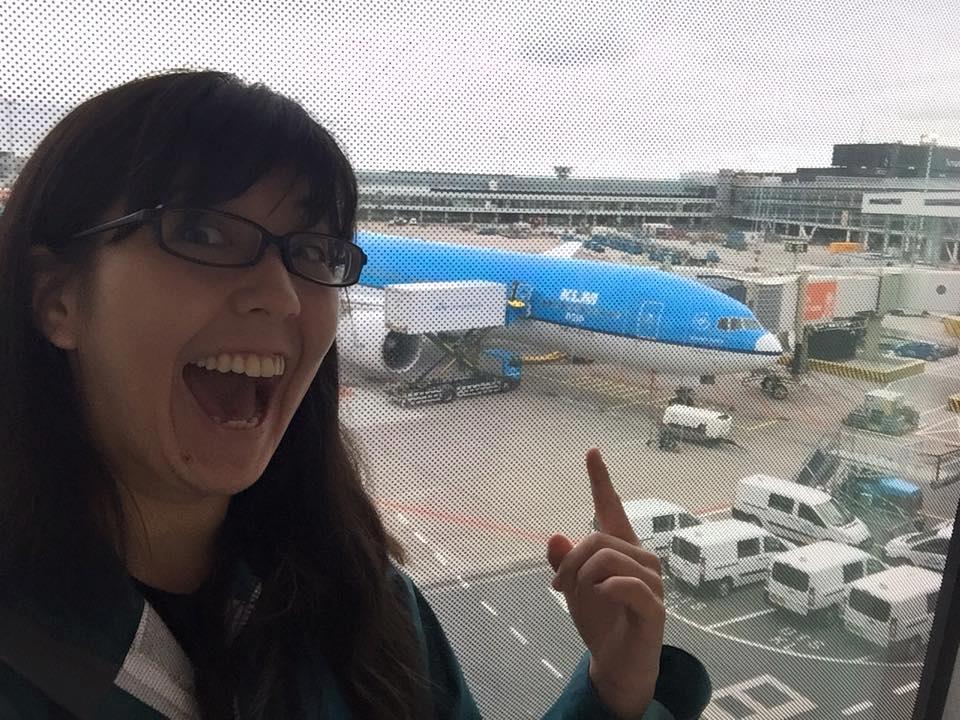Kiri McLaughlin is among the first three Americans to receive the MEXT scholarship for undergraduate students. After completing her studies in Sociology at the University of Tokyo, Kiri positioned herself as the international liaison at one of Japan’s largest web development companies. Kiri currently acts as the Chief Operating Officer at 77hz, Ltd., known for the music event information portal, iFLYER, in Shibuya, Tokyo.
*This article has been edited from the original interview for brevity and clarity.
Applying for the scholarship
How and when did you find out about the scholarship?
I can’t quite remember, but I know I found out about it either in 2005 or 2006. It might have been through a poster that was hanging in my Japanese classroom in high school, or I might have found out about it through someone at the Japanese consulate. I’m from outside Seattle, I’m also half Japanese, and my dad is really into ikebana so he used to do a lot exhibits and such with them, so we might have been at a festival at the consulate in Seattle. I think I spoke with some people from the consulate and they recommended it.
Did you apply during your last year of high school?
I applied in my second-to-last year in high school. So I took the tests and did the interviews when I was 17. I was still 17 when I came here.
So you came here right after you graduated from high school?
Well, actually, I ended up graduating a little bit early so that I could come here to meet up with the Japanese school year. I was supposed to graduate in June because of the United States’ school year so I graduated a semester earlier.
Tokyo Gaidai days

How many (undergrad) scholars were there in your year?
I think 66 at Tokyo University of Foreign Studies; it may have been a bit less than that. And about the same in Osaka, I think.
Did you know any Japanese (language) before coming here?
I did know some Japanese before coming here. I’d taken Japanese as my foreign language in high school for about three and a half years. But still, it’s high school level Japanese so I was good by those standards, but when you actually come here it’s very different.
The first year was a great experience meeting my peers from different countries. There was another American from my year and we became very close, which was not what I was expecting. I met a lot of friends and we’re still quite close.
Are many of them still living here?
Some do. Quite a few people ended up going back to their home countries, or going to other countries, or just moving around within Japan either for grad school or for work.
Do you meet often with the ones that are still here?
With some of the people, yes. Some of them live one-station-away level so we still hang out sometimes. A couple of the guys from my year would sometimes organise something. About two years ago we all met at a restaurant in Kabukicho and we rented out the whole place. It was really fun.
What do you think about Tokyo Gaidai (Tokyo University of Foreign Studies)? Did you like the place? I went to Osaka and the campus was in the middle of nowhere so it was pretty hard to go anywhere and everyone just sort of stayed together the whole time because of this.
Well, Tokyo Gaidai is a little bit more central in the sense that we have access to a couple of train lines that make it pretty easy to go places. But still, at least for me, I didn’t understand how the trains worked at first so it took some time to figure out the difference between the local train and the rapid, and the semi-rapid and all of the transfers. So most of the time when we went out, we would bike to Chofu which is a couple of stations away, or get on the train and go to Shinjuku station, or go a couple of stations over to Musashi-Sakai because they had a karaoke place and things like that.
Did they divide you into different classes according to your level of Japanese?
Yes.
Which one were you placed into?
I was in what they called A-class which was the second from the top. So there was one class that was ahead of me, but there was a pretty big difference in level between those. And after that, there were the classes for people who were very new to Japanese.
So you didn’t struggle that much?
Well, no but it was still very hard.
Which classes did you take besides Japanese?
I majored in sociology so when I was in Gaidai, I took politics, economics, Japanese history.
University of Tokyo days
And then, after that year you applied to the University of Tokyo, right? Was that your first choice?
Yes, it was my first choice but it wasn’t originally when I came to Japan because I wasn’t particularly sure that I wanted to stay in Tokyo and I really wanted to go to Kansai. When I was in high school, I went to Osaka for a couple of weeks and I loved it. I’d only spent a couple of days in Tokyo and I was like, “I don’t know anyone here, I don’t know if I really wanna stay here”. But as time went on, I grew to love Tokyo so I put Todai (University of Tokyo) as my first choice.
When applying to Todai, did you have to take an exam or only an interview?
For me, it was an interview.
You said you were about 66 people, how did you split when it came to going to university?
It was pretty all over the place but I think a lot of people ended up staying within Kanto, some people went to Kansai, and other people went to other places, depending on the major.
How was your experience at Todai?
It was terrifying at first haha. But my classmates were very supportive, we were all supportive of each other so we would help each other study. We would often create study guides, so one person would be in charge of making a study guide for a particular class and everyone would do that and have their own domain that they would become the expert in, and people would go to them when they had questions and such.
Did you manage to make Japanese friends? Because one thing that most people struggle with, it was the same for me, is making friends with the Japanese students because you don’t know how to approach them or are afraid that your Japanese level won’t be good enough to talk to them.
I was very fortunate that my classmates were extremely friendly social people because I’m a little bit introverted, so I don’t usually go from myself to say hi, but they were friendly and approached me from the very first day. Even before the first day of classes, there’s a day for all the clubs at school to recruit new people and I wanted to join a dance club of some sort, so I told a couple of the girls from my class and they took me to all the different dance clubs to check them out. So my classmates were very friendly and I also ended up joining one fo those clubs and I made a lot of friends there. It was great because I had very supportive classmates and friends from the dance club.

Job hunting and first job
Did you do regular shuukatsu (job-hunting)?
I started shuukatsu during my third year but that year was also the year of the earthquake. So in March everyone was doing shuukatsu but a lot of the companies put a pause on that. I had applied to not so many companies. I was actually kind of shocked when I saw how many companies some of my Japanese classmates were applying to, but I didn’t end getting any offers at that point in time. But I had kind of decided that I wanted to continue my studies at that point. I was studying sociology but I was really interested in going into sociolinguistics so I ended up becoming a research assistant for a professor specializing in the subject at Todai for about 7 months. But partway through I came to realise that while I enjoyed it, I didn’t have a linguistics background to begin with and if I was to experience the Japanese shuukatsu and all of the unique culture that comes with it and work for a Japanese company straight out of undergrad, this was the only chance that I had, and I could come back and do research later on if it turned out that didn’t work for me. So at that point in time, it was probably September, regular shuukatsu was pretty much closed. But a friend of mine had seen an ad about a tech company looking for a “global person” to be their “global tantou” (person in charge of any global-related matter) so I ended up applying for that job and I got an offer from that company.
So that was your first job?
Yes, before I actually graduated I was working there part-time during my last year at Todai a couple of times a week and kind of got the feel for what a Japanese company felt like, and then I started working there full-time after I graduated.
How was your experience there?
It was an adventure. The first few months, we had training which consisted of a little coding, a little bit of design, a little of planning, a little bit of everything so that we could have a full view of what everything was like in the company. It was a great educational experience in the sense that you have people from all different levels but working to get them all up to the same level when it comes to working knowledge. Kind of like Gaidai in that sense.

After the training, you were assigned as the global tantou, was that different from what the others were doing?
I got assigned to the sales department as the global tantou, which was only me. So I went to sales and was there for the first year and a half, which was terrifying because it involved making calls in Japanese to companies and saying “Hello, I’m a foreign person and this is what is wrong with your foreign language website so let me come talk to you about how we can make it better”. Later on, we had a few more members in the global team. By coincidence, one of the team members was a kouhai (junior) from the same scholarship. And after that, I requested a change of position within the company. Sales is a great experience but it’s also very draining and I don’t think it works very well with my own personality so I ended up moving to the planning department. So I was there for the last couple of years from my time at that company.
How long were you at that company?
As a regular employee, four and a half years but if you count the time I was there as part-time, it comes to about five years.
Change of jobs and plans for the future
How did you decide to leave that company?
I really liked the people I was working with and I really liked what I was doing at my job, but there were some issues that I had with the company itself that just didn’t vibe well with me. I kind of felt like I was hitting a wall like “Am I gonna be the person that they come to for English translation help every time?”, I had my own work but I was also asked to do all this other stuff but not getting compensated for it. I felt like that was as far as I would go within the company. It was a lot of little things, and after a while, I talked to my boss, I was very close to him, briefly about it when we were not at work. And the next Monday, I got called into a meeting room and we talked about it more officially.
When you left that company, did you already have something else lined up?
No, I didn’t. I ended up going to Italy for a couple of weeks. And then I spent some time recharging. But pretty much from the time that I quit that job, I was interested in working at the place that I’m working at currently. I’d spoken to Sach, who is now the CEO, a couple of times before. We had met through mutual friends in the music industry and at that time I was still working at my old job. After I quit my job, we got in contact and he messaged me one day to come in for an interview and it was like “when can you start?”, so I was very fortunate.
That’s cool. That’s where you’re currently working, right?
Yes. When I started working at 77hz, I was brought as a project manager, which I had some experience with from my position in the planning department at my previous job.
How long did you stay as project manager? Or is it what you’re still doing right now?
I’m now the COO. The paperwork took some time to process, but we had a conversation about the possibility of it happening after about a year of me being at this company.
What kind of things do you have to do now as COO?
A lot of it is still project management but also thinking big picture about the company, how we can be successful, find new things to do, and a lot of relationship management.
What are your plans for the future?
I want to grow 77hz to be the best company it can be and be really strong in general. We’re a technology company working within the music industry. We have our media iFLYER that we’re known for, but we also have a lot of things running in the background that most people don’t see. I want to improve those and also make something even more cohesive and be such as a part of the music industry that it’s impossible to move without seeing us somewhere, even if you don’t realize that it’s us that you’re looking at. The other things will be, personally, I want to get my permanent residency. This is my 13th year in Japan and I think there’s a lot of things that I can still do here and I don’t know what it’s like to be an adult in the United States, which is kind of a strange thing to think about, so my plan is to stay.
I guess that means that you like it here. For example, what kind of things do you like?
It’s just so easy to do everything here. That might be because I’m living in Tokyo but everything is extremely accessible. But also because I’ve been here and created these connections with people here, I really love that and I don’t want to break off from that. Because Tokyo is such a transient city and so many people come in and also leave, I feel very fortunate that because I’ve been here I’ve met so many people that, even though they may have left and gone on to do different things in different parts of the world, I know that I can go to pretty much any city and look somebody up who I’ve met in Tokyo and crash at their place and of course they know my door is open to them, as well.

Could you give us a message for the kouhais?
I know it’s daunting and kind of scary, and very different from everything that you’ve known up until now, but this is an amazing opportunity and you’re going to make some of the best friends that you will have for the rest of your life, which is not something small. One thing to remember is that all of you are experiencing this together, you’re all coming from somewhere else and, no matter what happens in the future, you’ll have this time to look back on, to connect with each other.

